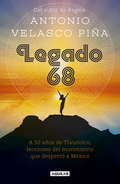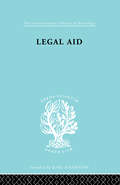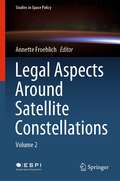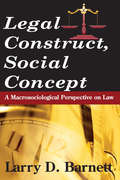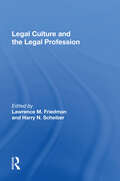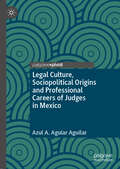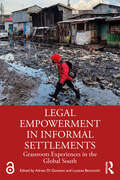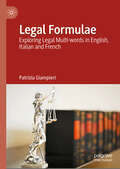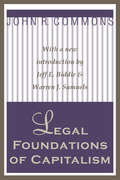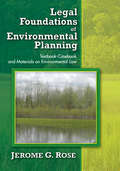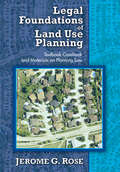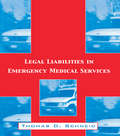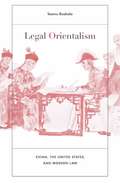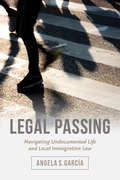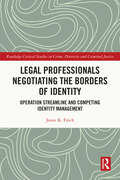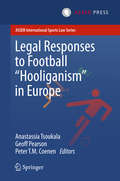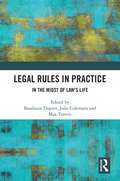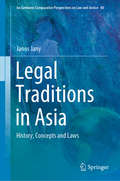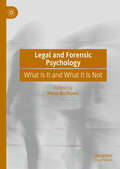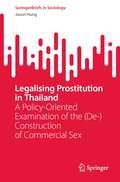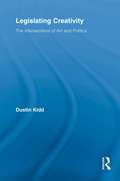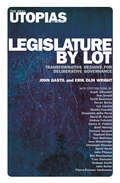- Table View
- List View
Legado 68: A 50 años de Tlatelolco, lecciones del movimiento que despertó a México
by Antonio Velasco PiñaEl libro para despertar la conciencia colectiva: una nueva era. Ha transcurrido medio siglo desde 1968 y con la perspectiva que da el tiempo, son ya muy distintas las conclusiones a las que lleva un análisis de lo ocurrido en el mundo entre el 21 de marzo y el 2 de octubre de aquel año. Las denuncias y movimientos contestatarios al estatus quo no tuvieron su origen en indescifrables misterios, y las lecciones resultantes de estos levantamientos tampoco pasan desapercibidas. Velasco Piña, el escritor célebre de Regina, hace un exhaustivo análisis de lo que llevó a ese parteaguas, el Movimiento Planetario de 1968 y la alteración en la conciencia de la humanidad a partir de entonces.
Legal Aid Ils 210 (International Library of Sociology)
by Robert EgertonFirst published in 1998. Routledge is an imprint of Taylor & Francis, an informa company.
Legal Aspects Around Satellite Constellations: Volume 2 (Studies in Space Policy #31)
by Annette FroehlichThis book is the highly anticipated sequel to the previous volume under the same title, dedicated to presenting a diverse range of timely and valuable contributions on the legal and policy related questions evoked by satellite constellations, including emerging mega-constellations. Given the proliferation of activities in the field of satellite constellations, and the critical roles they play in supporting and enabling communication, navigation, disaster monitoring, Earth observation, security and scientific activities, the insights of legal and policy experts from around the world have been gathered in this second volume to help expand the scientific literature in this precious field. Topics range from legal obstacles and opportunities facilitating small satellite enterprise for emerging space actors, international cooperation in the compatibility and interoperability of navigation systems, the designation of satellite constellations as critical space infrastructure, to an analysis of the paradigm shift which has occurred over the last decade to make the proliferation of small satellite constellations possible, and more.
Legal Construct, Social Concept: A Macrosociological Perspective on Law
by Larry BarnettBased on sophisticated demographic analysis, Legal Construct, Social Concept argues that legal doctrine on social issues is shaped by the needs and values of society rather than by individuals and interest groups and that it evolves in response to social change but has little impact on that change. The book also explains why a substantial body of social science research has found that although law may be effective for some types of economic problems, its impact on social problems is generally small and of brief duration. At least in the United States, legal doctrine seems to operate primarily to provide symbols that enhance commitment to the social system and increase the cohesiveness of the system.Barnett's approach to legal thought derives from the practices and assumptions of the social sciences, particularly sociology, and not from those of critical legal studies. His main concern is with social issues issues that substantively differ from economic issues. In addressing legal thought on social problems with the conceptual framework and quantitative techniques of macrosociology, he considers a topic that is infrequently investigated and employs an approach that is infrequently used.To illustrate this thesis, Barnett presents data on social patterns relevant to three current issues: sex discrimination, age discrimination, and the availability of contraception and abortion. His analyses of these data are compared to constitutional philosophy, judicial rulings, and federal statutes. Barnett then turns from the evolution of legal doctrine in the past to its possible change in the future and considers whether active forms of euthanasia are likely to be legalized. He concludes with an exploration of additional issues for future research and theory.
Legal Culture And The Legal Profession
by Lawrence M FriedmanDistinguished scholars in law and the social sciences examine the state of American legal culture, particularly adversarial legalism, in light of the criticisms of the current anti-lawyer movement. They assess the strengths and weaknesses of this culture, its impact on the broader society, and its recent spread to other countries. The American legal system is under heavy attack for the impact it is supposed to have on American culture and society generally. A common complaint of the anti-lawyer movement is that under the influence of lawyers we have become a litigious society, in the process undermining traditional American values such as self-reliance and responsibility. In this volume a group of distinguished scholars in law and the social sciences explores these questions. Neither an apology for lawyers nor a critique, Legal Culture and the Legal Profession examines the successes and the problems of the U. S. legal system, its impact on the broader culture, and the spread of American legal culture abroad.
Legal Culture, Sociopolitical Origins and Professional Careers of Judges in Mexico
by Azul A. Aguiar AguilarThis book explores the careers, professional trajectories and legal cultures of judges in the federal judiciary in Mexico. So far, there has been limited research on internal factors contributing to the understanding of judicial power dynamics in Mexico and other Latin American countries at large; this Work fills an important gap in the literature through its empirical investigation of internal legal cultures and judicial norms, offering new data, measurement strategies,and insights into the interactions between law, politics, norms, legal culture(s), as well as judicial behavior. Utilising an original survey, the chapters analyse judicial conceptualizations of role norms, legal cultures, proclivities for judicial activism, and judicial behavior. In so doing, this book contributes to understanding of underlying key internal factors of judicial activism or restraint, in turn moving forward the debate that seeks to explain judicial behavior reliant on internal and ideational perspectives. Complementing limited but existing studies of judicial politics in Mexico through its analysis of judges beyond those that sit at the Supreme Court, this book will be of particular interest to Latin-American judicial politics scholars due to its focus on the judicial power from internal perspectives as well as sub-national judges, filling a void in the literature vis-à-vis the study of courts in Latin America. This Work was originally written in Spanish, and the translation was done with the help of artificial intelligence. A subsequent human revision was done primarily in terms of content.
Legal Empowerment in Informal Settlements: Grassroots Experiences in the Global South
by Adrian Di GiovanniThis book investigates grassroots, community-led justice strategies – known as legal empowerment – being used to promote the human rights of people living in informal settlements in the Global South.Residents of informal settlements, also known as slums or favelas, encounter a complex array of human rights violations; from systemic discrimination by public officials, to threats to physical security from forced evictions, or arbitrary arrests, to a lack of access to basic services such as housing, water, sanitation, and education. This book shows how grassroots justice organizations around the world are working with residents to defend their rights and secure more dignified living conditions. Drawing on original empirical research across 10 countries in Africa, Asia, and Latin America, the book demonstrates how legal empowerment can put residents at the centre of holistic approaches to urban development and confront exclusionary and undemocratic systems of governance. The book encompasses practical recommendations and strategies such as rights-based approaches to informality, participation, community mobilization and litigation.Bridging the gaps between the law on the books and the harsh realities of informality on the ground, this book will be an important read for researchers, practitioners, and policymakers, working in realms of social and economic rights, access to justice and urban poverty and development.
Legal Formulae: Exploring Legal Multi-words in English, Italian and French
by Patrizia GiampieriThis book analyses and investigates the neutral legal formulae of the English common law and the Italian and French civil law traditions, together with those used in international settings such as the European Union. It explores the usage of English formulae (and of their Italian and French counterparts) that are mentioned in terms of service, national and EU legislation, and in national and European parliamentary debates. The author takes a comparative approach to analysing the various corpora, carrying out cross-analyses to allow understanding of the usage(s) in contexts of neutral legal formulae. This reveals insights into word frequencies in the three languages and legal systems, as well as in different genres, and the book goes on to compare the relative frequencies of the neutral formulae across the three languages to investigate their variety. This book will be of interest to academics, students and practitioners in fields including linguistics, law, and corpus-based legal translation.
Legal Foundations of Capitalism (Reprints Of Economic Classics Ser.)
by John R. CommonsIn what has universally been recognized as a classic of institutional economics, John R. Commons combined the skills of a professional economist, the sensibilities of an American historian, and the passion of an active participant in the conflicts of individuals, self-interest of groups, and function of voluntary associations.The aim of this volume is to work out an evolutionary and behavioral theory of value. In order to do so thoroughly, Commons examines the decisions of the courts. Doing so compelled an examination of what the courts mean by reasonable value. Commons found that the answer was tied up with a notion of reasonable conduct. It was Commons who carried the study of the habits and customs of social life to the next stage: the decisions of the courts that are based on custom and that profoundly impact the nature and function of the economic system as such.Reviewing Legal Foundations of Capitalism, Wesley Mitchell declared that Commons carried this "analysis further along his chosen line than any of his predecessors. Into our knowledge of capitalism he has incorporated a great body of new materials which no one else has used adequately." And writing in the same American Economic Review twenty-one years later, Selig Perlman noted that "To Commons the workingmen were not abstract building blocks out of which a favored deity called History was to shape the architecture of the new society, but concrete beings with legitimate ambitions for a higher standard of living and for more dignity in their lives." This edition is graced with a special introduction that places Commons in proper academic as well as intellectual context.
Legal Foundations of Environmental Planning: Textbook-Casebook and Materials on Environmental Law
by Jerome G. RosePlanners and lawyers engaged in the formulation and implementation of plans affecting the environment should have a working knowledge of the legal principles affecting those plans. They should also be familiar with the principles of environmental law. However, environmental law has not been a traditional part of the curriculum of law schools. Many practicing lawyers have never taken a course in environmental law; nor have many of the judges charged with deciding cases whose outcome may have consequences for the environment.In the interest of counteracting this lack of knowledge, Legal Foundations of Environmental Planning integrates excerpts from more than seventy-five court case rulings to illustrate the system of environmental laws and the problems of enforcement.Dedicated specifically to discussions on legal theories and procedures, air pollution, water pollution, and control of population growth and distribution, this sourcebook also includes an extensive glossary of environmental terms. It is a valuable aid for students, legal specialists, public officials, environmental professionals, and urban planners.
Legal Foundations of Land Use Planning: Textbook-Casebook and Materials on Planning Law
by Jerome G. RoseUrban planning is a community process, the purpose of which is to develop and implement a plan for achieving community goals and objectives. In this process, planners employ a variety of disciplines, including law. However, the law is only an instrument of urban planning, and cannot solve all urban problems or meet all social needs. The ability of the legal system to implement the planning process is limited by philosophical, historical, and constitutional constraints. Jurisprudence is concerned with societal values and relationships that limit the effectiveness of the law as an instrument of urban planning. When law is definite and certain, freedom is enhanced within the boundaries created by the law. This doctrine of Anglo-American law imposes an obligation on courts to be guided by prior judicial decision or precedents and, when deciding similar matters, to follow the previously established rule unless the case is distinguishable due to facts or changed social, political, or economic conditions The author focuses on seven specific areas of law in relation to land use planning: law as an instrument of planning, zoning, exclusionary zoning and managed growth, subdivision regulations, site plan review and planned unit development, eminent domain, and the transfer of development rights. Jerome G. Rose cites more than one hundred court cases, and the indexed list serves as a useful encyclopedia of land use law. This is a valuable sourcebook for all legal experts, urban planners, and government officials.
Legal Liabilities in Emergency Medical Services
by Thomas D. SchneidThis text is the first of its kind to address the various legal issues facing the emergency medical service. Readers will find a myriad of legal issues ranging from bloodborne pathogens to wage issues. Schneid offers not only insight into the applicable laws but also proactive approaches to avoid or minimize the risks of litigation. A must for every manager and administrator with emergency medical responsibilities.
Legal Orientalism
by Teemu RuskolaAfter the Cold War, how did China become a global symbol of disregard for human rights, while the U. S positioned itself as the chief exporter of the rule of law? Teemu Ruskola investigates globally circulating narratives about what law is and who has it, and shows how “legal Orientalism” developed into a distinctly American ideology of empire.
Legal Passing: Navigating Undocumented Life and Local Immigration Law
by Angela S. GarcíaLegal Passing offers a nuanced look at how the lives of undocumented Mexicans in the US are constantly shaped by federal, state, and local immigration laws. Angela S. García compares restrictive and accommodating immigration measures in various cities and states to show that place-based inclusion and exclusion unfold in seemingly contradictory ways. Instead of fleeing restrictive localities, undocumented Mexicans react by presenting themselves as “legal,” masking the stigma of illegality to avoid local police and federal immigration enforcement. Restrictive laws coerce assimilation, because as legal passing becomes habitual and embodied, immigrants distance themselves from their ethnic and cultural identities. In accommodating destinations, undocumented Mexicans experience a localized sense of stability and membership that is simultaneously undercut by the threat of federal immigration enforcement and complex street-level tensions with local police. Combining social theory on immigration and race as well as place and law, Legal Passing uncovers the everyday failures and long-term human consequences of contemporary immigration laws in the US.
Legal Professionals Negotiating the Borders of Identity: Operation Streamline and Competing Identity Management
by Jessie K. FinchThis book uses a controversial criminal immigration court procedure along the México-U.S. border called Operation Streamline as a rich setting to understand the identity management strategies employed by lawyers and judges. How do individuals negotiate situations in which their work-role identity is put in competition with their other social identities such as race/ethnicity, citizenship/generational status, and gender? By developing a new and integrative conceptualization of competing identity management, this book highlights the connection between micro-level identities and macro-level systems of structural racism, nationalism, and patriarchy. Through ethnographic observations and interviews, readers gain insight into the identity management strategies used by both Latino/a and non-Latino/a legal professionals of various citizenship/generational statuses and genders as they explain their participation in a program that represents many of the systemic inequalities that exist in the current U.S. criminal justice and immigration regimes. The book will appeal to scholars of sociology, social psychology, critical criminology, racial/ethnic studies, and migration studies. Additionally, with clear descriptions of terminology and theories referenced, students can learn not only about Operation Streamline as a specific criminal immigration proceeding that exemplifies structural inequalities, but also about how those inequalities are reproduced—often reluctantly—by the legal professionals involved.
Legal Responses to Football Hooliganism in Europe
by Anastassia Tsoukala Geoff Pearson Peter T. M. CoenenThis book brings together a number of perspectives on how different European states have responded to the phenomenon of football crowd disorder and violence, or "hooliganism". It applies a comparative legal approach, with a particular focus on civil and human rights, to analyze domestic legislation, policing and judicial responses to the problem of "football hooliganism" in Europe. Academics and legal professionals from eight different European countries introduce and analyze the different approaches and draw together common themes and problems from their various jurisdictions. They offer insights into the interactions between (domestic) politicians, law enforcers and sports authorities. The book is important reading for scholars and practitioners in the fields of law, sports law, sociology and criminology, and for all those concerned with questions of law enforcement and human rights. While it perfectly fits the curriculum for postgraduate studies in the fields mentioned, it is also highly recommended as secondary reading for undergraduate students. Dr. Anastassia Tsoukala is tenured Associate Professor at the University of Paris XI, France. Dr. Geoff Pearson is Senior Lecturer in Criminal Law at the University of Manchester's Law School, Manchester, United Kingdom. Dr. Peter Coenen was Assistant Professor of Law at Maastricht University in the Netherlands.
Legal Rules in Practice: In the Midst of Law’s Life
by Baudouin Dupret; Julie Colemans; and Max TraversUnderstanding legal rules not as determinants of behavior but as points of reference for conduct, this volume considers the ways in which rules are invoked, referred to, interpreted, put forward or blurred. It also asks how both legal practitioners and lay participants conceive of and participate in the construction of facts and rules, and thus, through decisions, defenses, pleas, files, evidence, interviews and documents, actively participate in law’s life. With attention to the formulation of notions such as person, evidence, intention, cause and responsibility in the course of legal practices, Legal Rules in Practice provides the outlines of a praxiological anthropology of law – an anthropology that focuses on words, concepts and reasoning as actively used to solve conflicts with the help of legal rules. As such, it will appeal to sociologists, anthropologists and scholars of law with interests in ethnomethodology, rule-based conduct and practical reasoning.
Legal Traditions in Asia: History, Concepts and Laws (Ius Gentium: Comparative Perspectives on Law and Justice #80)
by Janos JanyThis book offers a comparative analysis of traditional Asian legal systems. It combines methods from legal history, legal anthropology, legal philosophy, and substantive law, pursuing a comprehensive approach that offers readers a broad perspective on the topic. The geographic regions covered include the Near East, Middle East, Central Asia, India, China, Japan, and Southeast Asia. For each region, the book first provides historical and political context. Next, it discusses major milestones in the region’s legal history and political institutions, as well as its forms of government. Readers are then presented with fundamental principles and terms needed to understand the legal arguments discussed. The book begins with the Ancient Near East and important topics such as Jewish law. The next part considers Islamic law, while also exploring modern issues. The third part focuses on Hindu and Buddhist law, while the fourth part covers China and Japan. The book’s closing section examines tribal societies, e.g. Mongols, Pashtuns and Malays. Topics covered include the interaction of legal systems within a legal circle, inter-systemic interactions, reasons for the failure and success of legal modernization, legal pluralism, and its effects on Asian societies. Family law, law of obligation, criminal law, and procedural law are also explored.
Legal and Forensic Psychology: What Is It and What It Is Not
by Irena BoškovićThis book seeks to distinguish empirically-based knowledge from widespread misconceptions in the fields of legal and forensic psychology. Across ten chapters, leading scholars contribute different perspectives on their areas of expertise within the fields of legal and forensic psychology, providing a comprehensive overview of the historical context and defining characteristics of these two disciplines. The first section of the book is dedicated to legal psychology, exploring issues such as pseudoscience in lie detection, the use of polygraphs, and the reliability of eyewitness testimony and memory reports in legal settings. The second focuses on forensic psychology, addressing topics such as the relationship between criminal behavior and psychopathology, symptom validity assessment, risk assessment, and the treatment of forensic patients. As such, this vital book will serve as an excellent starting point for those seeking to educate themselves about these disciplines.
Legalising Prostitution in Thailand: A Policy-Oriented Examination of the (De-)Construction of Commercial Sex (SpringerBriefs in Sociology)
by Jason HungThis book problematises the socioeconomic and institutional construction of prostitution in Thai contexts, identifying the root causes that propel underprivileged, discriminated and deprived women and girls to enter the sex industry. The author considers Thailand’s tolerance of prostitution and sex trafficking, despite criminalising prostitution since 1960. In doing so, they explain how criminalising prostitution does not lower the odds of women and girls engaging in commercial sex, but rather, legally marginalises them from receiving the necessary social and healthcare support. The book highlights that neither can Thailand pragmatically practice a zero-tolerance stance against prostitution - primarily due to severe police corruption and its heavy reliance on the sex tourism economy to support the national economic growth - nor is Thailand willing to fully crack down on the domestic sex industry. Engaging in an evaluation of how legalising and decriminalising prostitution, along with continuing to implement policies and interventions that alleviate the root causes of prostitution, can help Thailand build a more inclusive society and less-prostitution-reliant economy in the long term, the book provides a nuanced understanding of the relationships between society, inequality, governance, criminality, and policy in Southeast Asian contexts. It is relevant to students and researchers in sociology, socio-criminology, public policy, government and Southeast Asian studies.
Legendary Lionesses: The England Women’s Football Team, 1972–2022
by Jean WilliamsThis is the first academic history of the FA England women’s national football team. Based on unprecedented access to FA data, it details the careers of the 227 women who debuted for England from 1972 to 2022. England won the UEFA Women’s Euros in 2022, and Jean worked with Sarina Wiegman and the squad, on the Legendary Lionesses from 1972.
Legends in Gandhian Social Activism: Addressing Environmental Issues By Dissolving Gender And Colonial Barriers (Ecology and Ethics)
by Bidisha MallikThis book is about Madeleine Slade (1892-1982) and Catherine Mary Heilemann (1901-1982), two English associates of Mohandas K. (Mahatma) Gandhi (1869-1948), known in India as Mira Behn and Sarala Behn. The odysseys of these women present a counternarrative to the forces of imperialism, colonialism, capitalism, and globalized development. The book examines their extraordinary journey to India to work with Gandhi and their roles in India’s independence movement, their spiritual strivings, their independent work in the Himalayas, and most importantly, their contribution to the evolution of Gandhian philosophy of socio-economic reconstruction and environmental conservation in the present Indian state of Uttarakhand. The author shows that these women developed ideas and practices that drew from an extensive intellectual terrain that cannot be limited to Gandhi’s work. She delineates directions in which Gandhian thought and experiments in rural development work and visions of a new society evolved through the lives, activism, and written contributions of these two women. Their thought and practice generated a new cultural consciousness on sustainability that had a key influence in environmental debates in India and beyond and were responsible for two of the most important environmental movements of India and the world: the Chipko Movement or the movement against commercial green felling of trees by hugging them, and the protest against the Tehri high dam on the Bhagirathi River. To this day, their teachings and philosophies constitute a useful and significant contribution to the search for and implementation of global ideas of ecological conservation and human development.
Legislating Creativity: The Intersections of Art and Politics (Routledge Advances in Sociology)
by Dustin KiddHow does political policy-making shape the creative activities of artists? Do the political interests of artists influence actual political practices in any way? Legislating Creativity examines the relationship between art and politics through an analysis of controversial art projects tied to the National Endowment for the Arts during the Culture Wars (late 1980s-1990s). Though there have always been tensions in government funding for the arts, these controversies intensified the public debates surrounding art/politics and remain as a focal point in conversations that continue today. The book focuses on three case studies: Mapplethorpe's controversial photography, an exhibit on the impact of AIDS entitled Witnesses, and the Guerrilla Girls. Dustin Kidd has provided a thoroughly enriching look at the intersections of art and politics—the ways that political practices transform creative expression and the ways that artistic drives shape political policies.
Legislature by Lot: Transformative Designs for Deliberative Governance
by Erik Olin Wright John GastilDemocracy means rule by the people, but in practice even the most robust democracies delegate most rule making to a political classThe gap between the public and its representatives might seem unbridgeable in the modern world, but Legislature by Lot examines an inspiring solution: a legislature chosen through “sortition”—the random selection of lay citizens. It’s a concept that has come to the attention of democratic reformers across the globe. Proposals for such bodies are being debated in Australia, Belgium, Iceland, the United Kingdom, and many other countries. Sortition promises to reduce corruption and create a truly representative legislature in one fell swoop.In Legislature by Lot, John Gastil and Erik Olin Wright make the case for pairing a sortition body with an elected chamber within a bicameral legislature. Gastil is a leading deliberative democracy scholar, and Wright a distinguished sociologist and editor of the Real Utopias series, of which this is a part. In this volume, they bring together critics and advocates of sortition who have studied ancient Athens, deliberative polling, political theory, social movements, and civic innovation. Without obscuring its limitations, the contributors offer a wide variety of ideas for how to implement sortition and examine its potential for reshaping modern politics.Legislature by Lot includes sixteen essays that respond to Gastil and Wright’s detailed proposal. Essays comparing sortition to contemporary reforms see it as a dramatic extension of deliberative “minipublics,” which gather random samples of citizens to weigh public policy dilemmas without being empowered to enact legislation. Another set of essays explores the democratic principles underlying sortition and elections and considers, for example, how a sortition body holds itself accountable to a public that did not elect it. The third set of essays considers alternative paths to democratic reform, which limit the powers of a sortition chamber or more quickly establish a pure sortition body.With contributions by Arash Abizadeh, Tom Arnold, Terrill Bouricius, Deven Burks, Lyn Carson, Dimitri Courant, Donatella della Porta, David M. Farrell, Andrea Felicetti, James S. Fishkin, Brett Hennig, Vincent Jacquet, Raphaël Kies, Tom Malleson, Jane Mansbridge, Christoph Niessen, David Owen, John Pitseys, Min Reuchamps, Yves Sintomer, Graham Smith, Jane Suiter, and Pierre-Étienne Vandamme.
Legitimacy and Illegitimacy in Nineteenth-Century Law, Literature and History
by Jenny Bourne Taylor Margot Finn Michael LobbanThis innovative collection of essays by prominent scholars from the disciplines of literary studies, history and law explores the many ways in which notions of legtitimacy were shaped and contested in Georgian and Victorian Britain. It probes the difficulties of drawing boundaries between the legitimate and the illegitimate which continued to trouble Victorian society and which were explored in novels such as Charles Dickens's Bleak House and Wilkie Collins's The Woman in White. The essays in this collection show how dilemmas over legitimacy unsettled families by challenging clear lines of inheritence; they also unsettles society, as forgers and imposters defrauded individuals, estates and institutions through widely publicised social performances which fascinated both contemporary culture and called into question the idea of legitimacy itself. "
